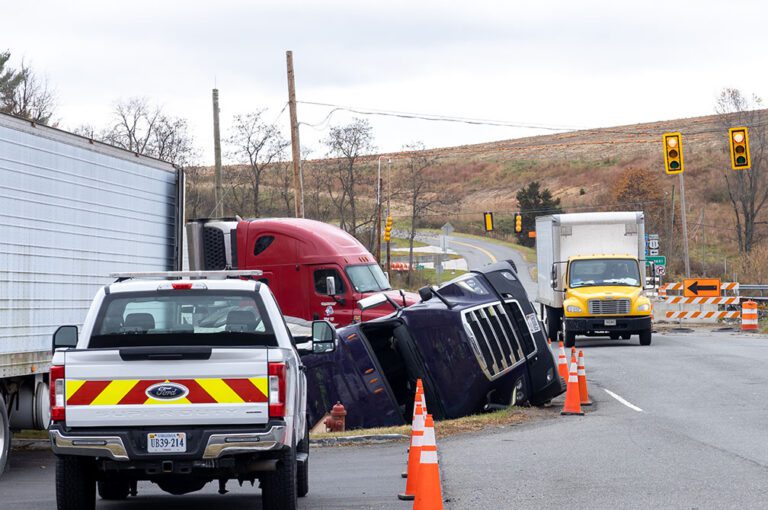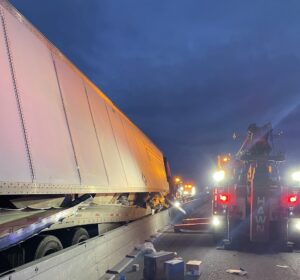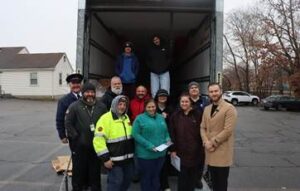Truck drivers spend countless hours behind the wheels of their rigs each year, traveling millions of miles across the nation. During their journeys, they encounter all kinds of drivers — the good, the bad and the downright dangerous.
A recent survey conducted by insurtech firm Cover Whale and The Trucker Media Group asked drivers about roadway safety and their experiences while out on the job. More than 1,000 drivers — 1,047, to be exact — participated in the survey.
The majority (79%) of drivers who responded to the survey said they see unsafe driving by passenger vehicles on a “very regular basis.” Meanwhile, 42% reported that they see unsafe driving by other truck drivers on a “very regular basis.”
A total of 34% of truck drivers revealed that they must often take evasive action to avoid an accident, and 17% of truck drivers said they see an accident “on a very regular basis.” Forty-six percent of truck drivers surveyed cited unexpected lane changes as an action most likely to result in an accident.
Perhaps most revealing about respondents’ confidence in the legal system is that 43% of respondents indicated they are “not at all confident” that blame would be accurately assigned following an accident if there is no video evidence.
The seven-question survey was conducted between March 22 and April 30, 2023. Most (90.78%) of the drivers participating in the survey were male; 9.23% were female.
Dan Abrahamsen, founder and CEO of Cover Whale, told The Trucker that accidents involving big rigs are often not the fault of the truck driver; however, the drivers are usually found guilty if the case goes to court.
“That happens a majority of time,” Abrahamsen said. “From an insurance standpoint, passenger vehicle (drivers) are not being held accountable by insurance companies. Truckers pay for it … insurance for commercial auto and trucking has risen in cost every quarter over the past decade.”
Abrahamsen says distracted driving is one of the main reasons for accidents.
“The problem isn’t new, but with smartphones, messaging services and apps, a lot of (accidents are cause by) distracted driving from people in their personal automobiles,” he said.
Cover Whale offers trucking industry clients multiple tips to stay out of accidents — and to stay out of the courtroom if an accident does take place.
Abrahamsen says in-cab cameras can be a helpful tool in preventing accidents as well as insurance fraud on the part of other drivers. For one thing, dash cams can help identify unsafe driving behaviors that are known to cause more accidents, he said. Additionally, dash cams provide opportunities for driver coaching by identifying unsafe habits and correcting them.
Most importantly at the time of an incident, cameras can capture footage before, during and after the event, helping to prove which driver was at fault.
Concerns about invasion of privacy are often expressed by drivers operating with dash cams, particularly inward-facing ones, Abrahamsen noted.
“We give drivers a sense of comfort with what a cam does and what it doesn’t do,” he said. “What it’s good at is NOT sending us video feed we don’t want. We don’t need to look at vids of drivers doing their job. What it CAN do is, with an artificial intelligence component, it can help (detect) drowsy driving, distracted driving, drivers asleep at wheel.”
There are many ways to address driver privacy concerns, according to Cover Whale. A good place to start is to distinguish between event-based recording and continuous recording, the company’s website notes.
Event-based recording only captures footage when specific events or incidents occur, such as sudden braking, swerving or a collision. The event-based approach ensures that only safety-related incidents are recorded, offering a more privacy-conscious solution. In contrast, continuous recording cameras capture footage during the entire time the vehicle is in operation.
It also helps to discuss with drivers the way the data is siloed. For instance, insurance companies that require dash cams are primarily focused on promoting road safety and reducing losses — not keeping tabs on drivers’ personal lives. The main objective is to lower accident rates and provide affordable policies while respecting drivers’ privacy.
One way Cover Whale addresses driver privacy concerns is by disabling any audio capture on the devices.
Turning to speed, Abrahamsen discussed the Federal Motor Carrier Safety Administration’s (FMCSA) proposal to require speed limiters on all commercial vehicles for safety. The FMCSA is expected to make a final ruling sometime this summer. Officials have not said what the capped speed should be.
Abrahamsen says the issue is a complicated one.
“Are we speeding in a location with the flow of traffic? (If so,) that’s probably more safe,” he noted, adding that speed limiters amount to “taking that decision out of truckers’ hands and putting in the form of a speed governor.”
Drivers are often resistant to this loss of control.
“I can see where drivers may take issue with that. All data and stats show that almost all (truckers) are safe, responsible professional drivers by and large. I don’t think it’s the driver’s speed that needs to be governor. Why is this focused on the truck driver and not other vehicles?
Abrahamsen says he believes if drivers and fleet managers want to improve safety, it boils down to these three things: cameras, coaching and coverage.
“We just want drivers — and everyone — to be safe while out on the roads,” he concluded. “That’s really what it’s all about.”
Linda Garner-Bunch has been with The Trucker since 2020, picking up the reins as managing editor in 2022. Linda has nearly 40 years of experience in the publishing industry, covering topics from the trucking and automotive industry to employment, real estate, home decor, crafts, cooking, weddings, high school sports — you name it, she’s written about it. She is also an experienced photographer, designer and copy editor who has a heartfelt love for the trucking industry, from the driver’s seat to the C-suite.















